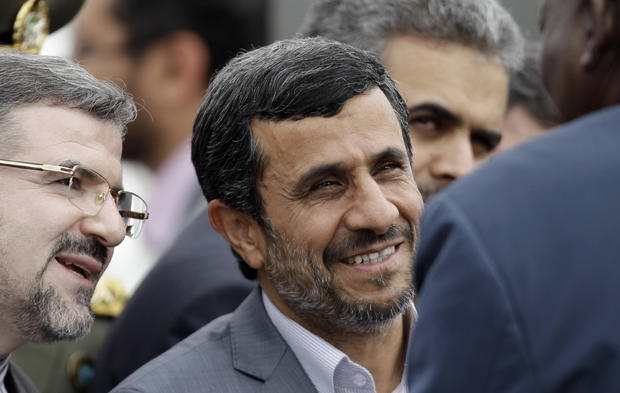In Cuba, Ahmadinejad shielded from press, questions
Iranian President Mahmud Ahmadinejad's visit to Cuba is being tightly contained. The media is not getting any chance to ask any questions despite news out of that country garnering worldwide attention: the bombing death Wednesday of an Iranian nuclear scientist; tensions with the U.S. over Iran's nuclear program; and the recently announced death sentence for an alleged U.S. spy.
Ahmadinejad waved at foreign journalists and made a victory sign on the tarmac of Havana's international airport, but his Cuban hosts steadily steered him away from the cameras and into a Mercedes for the 20 minute trip to the iconic Hotel Nacional, where he and his security-heavy entourage are staying.
Cuba is the third stop on Ahmadinejad's four-nation Latin American tour that has already included Venezuela and Nicaragua. Early Thursday morning he flies to Ecuador. The leaders of all the countries visited -- particularly Hugo Chavez and Fidel Castro -- have repeatedly criticized the United States, and Ahmadinejad is enjoying support for his own anti-U.S. rhetoric during the trip, but it's unlikely that any major geo-political steps will be taken.
At the University of Havana Wednesday afternoon, Ahmadinejad accused the western powers of heartlessness and being willing to kill millions just to win an election. He spoke of the deaths in Afghanistan caused by the desire to control oil and said capitalism is a failure. Ahmadinejad attacked the U.S. more directly asking, "Why are the Iranian, Cuban, and Latin American people punished and hated in some way by the United States? Have we attacked anywhere? Have we asked for more than what we deserve? Never."
There was a notable absence of Cuban officials at the event with the exception of vice president and Communist Party Politburo member Esteban Lazo, who had also welcomed the Iranian leader at the airport.
Ahmadinejad then headed to Havana's Revolution Square to lay a wreath at monument to national hero Jose Marti and to meet with President Raul Castro and former President Fidel Castro, who has defended Iran's right to develop nuclear technology for peaceful purposes.
The Iranian leader first visited Cuba in 2006 for the 14th Summit of the Non-Aligned Movement. Then-President Fidel Castro visited Iran in 2001. Havana officially recognized Iran shortly after the 1979 Iranian revolution.
In 2006, accords were signed to bolster relations. Cooperation expanded in banking, agriculture, health, culture and commercial areas. Trade between the two countries hit $5 million in 2006 and Iran granted Cuba a 200 million Euro credit line in 2008. That is expected to rise to 500 million.
